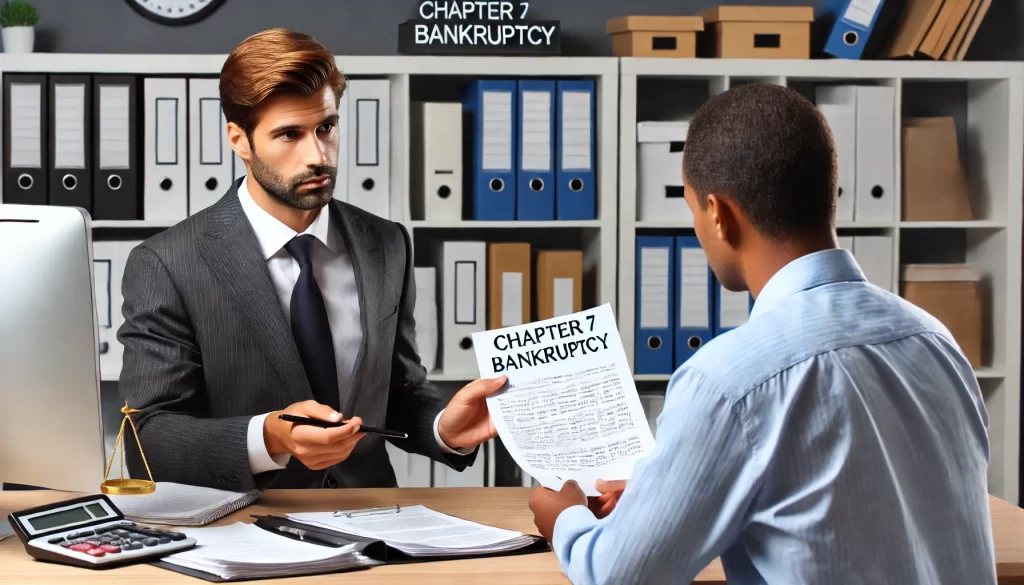How Much Does a Lawyer Charge for Chapter 7? Shocking Truth Revealed

Table of Contents
Filing for Chapter 7 bankruptcy can be a tough decision, and one of the biggest concerns for most people is the cost. How much does a lawyer charge for Chapter 7 bankruptcy? This question is critical because, during financial hardship, paying for a lawyer can seem overwhelming. In this article, we’ll uncover the shocking truth about the fees of hiring a lawyer for Chapter 7. By the end, you’ll clearly understand what to expect, ensuring you are prepared for costs.
What is Chapter 7 Bankruptcy?

Chapter 7 bankruptcy is often called “liquidation bankruptcy” because it involves selling your assets to pay off debts. If you’re drowning in debt with no apparent way out, filing for Chapter 7 may be a solution to give you a fresh financial start. Certain assets are protected in this type of bankruptcy, but others may be sold to pay creditors. After completing the process, most debts are discharged, meaning you are no longer legally required to pay them.
How Much Does a Lawyer Charge for Chapter 7 plays a vital role in the process because having a lawyer guide you can make the bankruptcy smoother, avoid errors, and ensure all necessary paperwork is submitted correctly.
Why Do You Need a Lawyer for Chapter 7?

While I can file for Chapter 7 independently, it’s risky without a lawyer. Filing for bankruptcy involves complex legal steps; even small mistakes can lead to your case being dismissed. An experienced lawyer understands the system, the paperwork, and the deadlines. They also know how to protect your assets and minimize your losses. A lawyer’s expertise could mean the difference between success and failure in bankruptcy court.
So, how much does a lawyer charge for Chapter 7? Let’s dig into the costs in detail below.
How Much Does a Lawyer Charge for Chapter 7?
Average Lawyer Fees for Chapter 7
On average, a lawyer charges between $1,000 and $3,500 for Chapter 7 bankruptcy cases. However, this range can vary based on factors such as location, the complexity of your case, and the lawyer’s experience. If your case involves more assets or disputes, you might be looking at fees toward the higher end of this range.
Lawyers in smaller towns may charge less, while those in major cities typically charge more. Before making a decision, it’s always a good idea to consult multiple lawyers to compare fees and services.
Factors That Affect Lawyer Fees for Chapter 7
Several factors influence how much does a lawyer charge for Chapter 7 bankruptcy, including:
- Location: Lawyers in larger cities or areas with a higher cost of living often charge more than those in rural areas.
- Complexity of the Case: If your financial situation is complicated (e.g., disputes over assets or income), the lawyer’s fee will likely be higher.
- Experience of the Lawyer: Highly experienced lawyers with a strong track record in bankruptcy cases may charge more than less experienced ones.
- Payment Plan Options: Some lawyers may offer flexible payment plans, allowing you to pay the fee over time and making it easier to afford legal help.
Additional Costs to Consider
In addition to answering how much does a lawyer charge for Chapter 7, there are other costs you should take into account when filing for Chapter 7 bankruptcy.
Court Filing Fees
You’ll need to pay a court filing fee of about $338, separate from the lawyer’s fees. This fee is mandatory for anyone filing for Chapter 7 bankruptcy and must be paid upfront. Some courts allow you to pay this fee in installments if you cannot simultaneously pay it.
Credit Counseling and Debtor Education Fees
Before and after filing for Chapter 7, you must take credit counseling and debtor education courses. Depending on the provider, these courses can cost anywhere between $20 to $100.
Miscellaneous Fees
Additional costs could include document preparation, court appearances, or obtaining copies of necessary records. While these aren’t huge expenses, they can add up over time.
Can You File for Chapter 7 Without a Lawyer?
Yes, it’s possible to file for Chapter 7 bankruptcy without hiring a lawyer, which is called filing pro se. However, this route is not recommended unless you thoroughly understand bankruptcy laws and procedures. Filing without a lawyer can lead to mistakes in your paperwork, missed deadlines, or even a case dismissal.
Without proper legal help, you risk losing more assets or not getting all your debts discharged. In the end, hiring a lawyer can save you time, stress, and possibly more money than handling the case yourself.
Can You Afford a Lawyer for Chapter 7?
Finding Affordable Lawyers
If you’re worried about how much a lawyer charges for Chapter 7, there are ways to find affordable legal help. Many lawyers offer free initial consultations, which allow you to discuss your case and get an estimate of fees before committing. Additionally, some lawyers provide payment plans or sliding scale fees based on your income.
Also Read: How Long Does Eviction Take in Florida? Shocking Truth!
Legal Aid and Pro Bono Lawyers
You might qualify for legal aid if you have a low income and cannot afford a lawyer. Legal aid organizations provide free or low-cost help to those in need. There are also pro bono (free) lawyers who volunteer their time to assist those who can’t afford to hire a lawyer.
Now that we’ve explored how much a lawyer charges for Chapter 7, it’s clear that fees can vary based on several factors. However, hiring a lawyer is often worth the cost of ensuring your bankruptcy filing goes smoothly. The financial relief Chapter 7 offers can be life-changing, and having the right lawyer by your side makes the process much less stressful.
Before making any decisions:
- Reach out to local lawyers.
- Compare their fees.
- See what payment options they provide.
This way, you can find the help you need without adding more financial burden.
By understanding how much does a lawyer charges for Chapter 7 and what to expect during the process, you’ll be better prepared to take control of your financial future.



